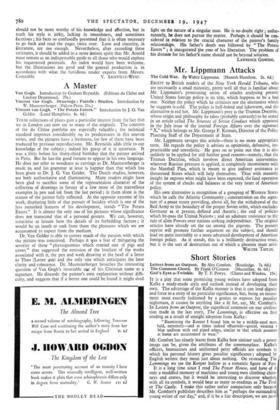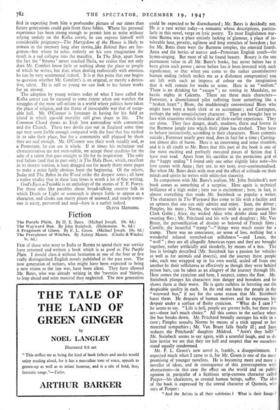Short Stories
IT is a pity that some promising young writers have adopted from Kafka a ready-made style and outlook instead of developing their own. The advantage of the Kafka manner is that it can lend dignity and force to a story of no particular significance, but, being an instru- ment most exactly fashioned by a genius to express his peculiar nightmare, it cannot be anything like a fit for, say, Mr. Comfort's. In Letters from an Outpost, the superficial comment on our civilisa- tion made in the last story, The Lemmings, is effective on first reading as a result of straight adoption from Kafka : " Examining the Keeper I found him to be a middle-aged man, bald, extremely—and at times indeed effusively—genial, wearing a blue uniform with red piped edges, similar to that which postmen at home are accustomed to wear."
Mr. Comfort has clearly learnt from Kafka how sinister such a power image can be, given the attributes of the commonplace. Kafka's officers, bureaucrats and uniformed petty officials are symbols to which his personal history gives peculiar significance ; adopted by English writers they mean just about nothing. On re-reading The ' Lemmings we see the Keeper hollow as a romantic figure of Fate.
It is a long time since I read The Power House, and have of it only a muddled memory of machines and young men climbing chim- neys and cranes, but it would be interesting to discover whether, with all its symbols, it would bear as many re-readings as The Trial or The Castle. I make this rather unfair comparison only because Mr. Comfort's publisher describes him as " perhaps the outstanding young writer of our day," and, if it be a fair description, we are just', Pied in expecting from him a profounder picture of our times than future generations could gain from these fables. Where his personal experience has been strong enough to permit him to write without relying unduly on the Kafka corset, he can express himself with considerable poignancy—The Marty"dam of the House is likely to remain in the memory long after storiesolike Behind Bars are for- gotten—but where he relies entirely on his own imagination the result is a sad collapse into the maudlin. In The Ship, apart from the fact the Struma ' never reached Haifa, we realise that not only does Mr. Comfort know little or nothing about the place or people of which he writes, but that, when dealing realistically with emotion, he can be very sentimental indeed. It is at this point that one begins to question whether Mr. Comfort's is an original, or merely a deriva- tive, talent. He is still so young we can look to his future works for an answer.
The adoption by young writers today of what I have called the Kafka corset can be excused to some extent when one watches the struggles of the more self-reliant in a world where politics have taken the place of religion, and the threat of inescapable war that of escap- able hell. Mr. O'Connor is fortunate in having for his field an
island in which age-old morality still gives shape to life. The Common Chord shows us Irish love contending with convention and the Church. These two devils cast out in England some time ago may seem feeble enough compared with the host that has rushed in to take their place, but for a community still plagued by them they are real enough. Mr. O'Connor sees their work steadily and, as a Protestant, he can see it whole. If at times his technique and characterisation are not over-subtle, we accept these crudities for the sake of a talent that goes straight to life for its inspiration. The only real failure (and that in part only) is The Holy Door, which, excellent in its shorter version, is here dragged out for nearly thirty more pages to make a point fairly obvious from the beginning. Of the others, Judas and The Babes in the Wood strike the deepest notes ; all have a native vitality that in these lean times is worth a lot of fine writing.
God's Eyes a-Twinkle is an anthology of the stories of T. F. Powys. For those who like parables about broad-talking country folk in which Death or Light or somesuch is always liable to appear as a character, and clocks can marry pieces of seaweed, and nearly every- one is nasty, perverted and mad—here is a surfeit indeed.
OLIVIA MANNING.



































 Previous page
Previous page